Rise of Nations Updated Preview
Brian Reynolds stops by to give us an updated look at this impressive real-time strategy game.
When is a real-time strategy game not a real-time strategy game? Pretty much never. Most real-time strategy games follow the same formula of frantically grabbing resources, frantically building up an army, and frantically pounding your opponents before they can do the same to you. But what about a real-time strategy game that focuses less on building up grunts and rushing your opponent until his or her base is a smoldering ruin, and more on classic strategy elements, like building up a massive empire and seizing control of the world? We recently had the opportunity to sit down with designer Brian Reynolds and his upcoming strategy game Rise of Nations, which will take a decidedly different approach to real-time strategy games. And judging from what we've seen, these new ideas will go a long way toward making Rise of Nations stand out from all those other real-time strategy games.
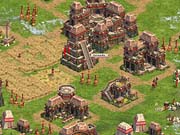
Rise of Nations will incorporate some intriguing ideas that will be the result of both Reynolds' extensive experience as cocreator of the strategy classics Civilization II and Alpha Centauri and careful analysis of what makes real-time strategy games fun and not so fun. For instance, Rise of Nations will minimize the amount of micromanagement you'd normally expect to find in a real-time strategy game. You'll still have peasant units that you can order to gather resources or build buildings, but as we saw for ourselves, peasants that are idle for too long will take it upon themselves to get up off their duffs and get to work on any resource-gathering job that requires attention. That's because Rise of Nations' resource model will be different from that of other real-time strategy games--you'll still be able to get wood from forests, metal from mountains, and so on, but none of these resource deposits will ever "run out," and you won't be able to get resources faster by sending out more peasants. Instead, the deposits will yield a certain amount of resources, and they'll only be able to support a certain number of peasants at a time. You can build technological advancements that will increase the yield from each of your holdings, but you'll be better off just going out and finding even more deposits. You'll also need to build farms to support your citizens, but you can only build so many farms per town. The same goes for your population limit--if you want more peasants to develop your town or soldiers to fill out your ranks, you'll need to build more towns and expand your empire.
Even though we were only able to spend a brief amount of time with the game, it's clear to us that Rise of Nations will favor aggressive, expansionist strategies. That's because the game will use a system of national borders that resembles the territory system from the Civilization games. As your borders expand, you'll gain control of more territory and more resources. You can expand your borders by building new towns and other structures, such as libraries and temples, at the outskirts of your territory--like in the culture system of Civilization III. However, it's much more effective--and may seem more appealing to would-be warlords--to declare war on enemy cities.
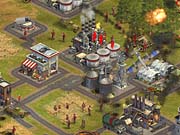
You'll need to fight through enemy soldiers using your own troops, which will vary in strength depending on how much technology you have available and what era your civilization has reached. Rise of Nations has eight different ages that your civilization will advance through, depending on its size and its investment in the game's four different areas of research: science, economics, military, and civics. These broad areas of research replace the kind of minimalist, one-step upgrades that are researched in most real-time strategy games, such as "light armor," followed by "medium armor," followed by "heavy armor," and so on. Each field of research has seven levels you can invest your funds and resources in, and researching one area more than the others will lend your civilization a distinctive character. For instance, focusing mainly on military research will let you access the most powerful soldiers fastest, while researching civics will help you expand your borders more quickly. Previously, this kind of conflict has really only been seen in turn-based games like Civilization, where one nation will attempt to take over the world by raising a massive army and conquering its neighbors one by one, while another will attempt to win by scrambling up the technology tree to win. It'll certainly be interesting to see how these different strategies will work against each other in a real-time strategy game.
Seizing Power
We did have an opportunity to see how armies will work against each other in Rise of Nations. Depending on your civilization's level of technology, you'll be able to recruit hoplites, archers, cannoneers, fighter jets, and even nuclear weapons to obliterate your enemies. And, of course, every civilization will have a unique unit. However, even though the combat will take place in real time, you won't necessarily see the same kind of big, disorderly battles--the kind where large groups of soldiers on each side stand around and beat on each other repeatedly--you've seen in so many other real-time strategy games. You'll have access to plenty of tactical options, like the ability to march your units in various formations, either tightly or loosely. You'll want to take the high ground against your enemies to gain a height advantage, but smart generals will also benefit greatly from moving their troops around in order to set up rear and flanking attacks. We watched a battle between two evenly matched squads of musketeers and cannons engage in what might have been a messy slugfest, except for the fact that one of the two armies divided its forces, sending half of the company in front to draw the enemy's attention, while the second half attacked from the flank, giving them a considerable advantage and allowing for a pretty decisive victory. Rise of Nations will display infantry companies as a group of three soldiers (rather than just one), and this will help you quickly glance at your troops and determine whether or not they're being flanked.
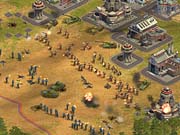
Since Rise of Nations will have eight different eras, each more technologically advanced than the last, you can also expect to see modern-day weaponry used in battle later on in the game. We watched an engagement between Soviet troops and NATO forces armed with M1 tanks. It was a standoff, but as we found out, even a military stalemate between the most heavily armed forces in the world can be broken up with a well-placed nuke. As civilizations progress further into the game and advance through the highest stages of research, they'll be able to access a top-level research project in each of the four disciplines. Naturally, these projects will be incredibly expensive, but after watching a weapon of mass destruction that can break through the toughest armies and utterly destroy infantry, we expect that at least some players will be willing to pay the cost. But as Reynolds explained, power-mad rulers who abuse these awesomely powerful weapons may set off the Armageddon clock, a timer that will appear in the upper-right corner of the screen. That is, if you, your neighbor, and your neighbor's neighbor all start launching nuclear warheads, the entire world could come to an end--in which case everybody loses. In spite of the risk, Reynolds explained that he and the testers at Big Huge Games still can't help but find the prospect of obliterating their enemies with nuclear weapons to be "very tempting," and we can see why.
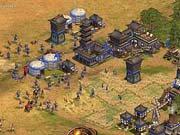
Regardless of exactly how you choose to do it, you're going to want to make sure you expand your empire, especially in a multiplayer game. In multiplayer, Rise of Nations will be all about momentum. According to Reynolds, one of the worst things about conventional real-time strategy games is how some players tend to hide off to the side and let everyone else do all the fighting. This definitely won't be a viable strategy in Rise of Nations, because in a successful battle, you won't raze your enemy's town--you'll capture it and make it your own. Once you damage an enemy town's central building enough and have the town surrounded with a strong enough military force, that town automatically becomes yours to use to recruit troops, conduct research, and build farms and other buildings to support your empire. It hasn't been determined yet whether a captured town will produce units that belong to the original civilization--in other words, whether an Aztec town captured by a Japanese army will be able to produce Aztec soldiers. It has been determined that captured towns will remain loyal to their original builders, at least for a while, and if given a chance, they may revolt. On the other hand, your opponent will have lost an entire town, and the size of his or her national borders will shrink considerably. If you try to cower in a corner, you'll find that your rivals will grow much larger and much more powerful than you, and that they'll be coming after you next. It's pretty clear that if you decide to develop a warmonger country in Rise of Nations, the best way to not get conquered will be to do all the conquering yourself.
War and Peace and What They'll Cost You
But conquest through the force of arms won't be the only way to take control of the world. For instance, Rise of Nations will also let you pursue an expansionist strategy by increasing your influence with wonders of the world. You'll also be able to seek a diplomatic victory by jointly controlling the most territory on the map with your allies. Forming an alliance with another nation's people will let you send your troops through their territory without provocation and clear away all the fog of war so you can see your ally's entire nation. Forming alliances can be a convenient way to expand your own influence and get at much-needed resources, because if you attempt to build structures or send troops outside of allied territory or your own borders, your units and structures will continuously sustain attrition damage. But don't think that you'll be able to form an alliance and then turn right around and stab your ally in the back, because breaching a peace treaty will cost you cash and resources.
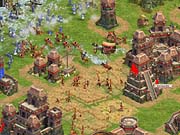
Rise of Nations will let you earn cash by developing a system of roads and trade within your borders and with your neighbors. Though the game has a basic set of resources--wood, metal, food, oil, gold, and knowledge (which can be obtained from scholars at universities)--it also has lots of other, secondary resources that can range from precious diamonds to horses that will let you build cavalry units. You'll also be able to drill for oil at sea later on in the game by building an oil rig, though you'll need to make sure you have a dock and the appropriate technology researched.
If you were tempted to stop reading this preview after you read the word "sea" in the above paragraph, you're probably a lot like Brian Reynolds. Reynolds explained how much he dislikes the way boats and naval combat are handled in most real-time strategy games--specifically, how you're always forced to build separate transports to carry every single unit you want to move. In Rise of Nations, as long as you've got a dock, you'll be able to walk your units right up to your dock and have a transport ship automatically built for them so they can get on the water and get sailing, as in the classic strategy game Command HQ. But as Reynolds explained, one of the problems with naval maps in many real-time strategy games is that underhanded opponents will build one transport ship with one peasant unit, sneak it past your perimeter, and build an entirely new base right in your backyard. In a lot of other games, transport ships can often outrun any combat ships that are giving chase, so these kinds of opponents can get off scot-free. Though the actual animations for this aspect of the game aren't quite finished yet, Reynolds demonstrated that warships will be able to put a definite end to this kind of tactic. Transport ships are slow-moving and completely defenseless if sent out without an escort. So if you manage to track down a fleet of enemy transports with one of your destroyers, there will be no chase--just a quick and rather painful end for those transports.
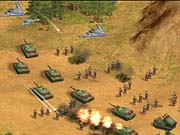
Even though Rise of Nations is scheduled for release early next year, it seems to be coming along extremely well. We have yet to see how several aspects of the game will work out, including the single-player campaign, which will consist of several separate campaigns for individual nations, as well as an all-purpose "conquer the world" campaign for any civilization. But if what we've seen is any indication, Rise of Nations is well on its way to becoming the intriguing and epic game Big Huge Games set out to create.
Got a news tip or want to contact us directly? Email news@gamespot.com
Join the conversation